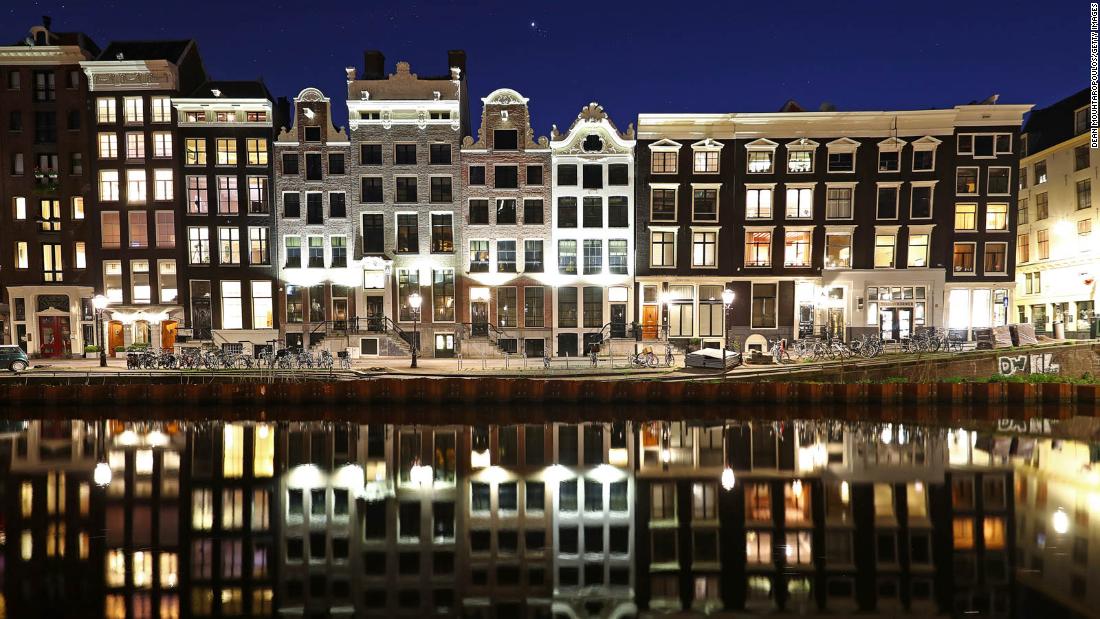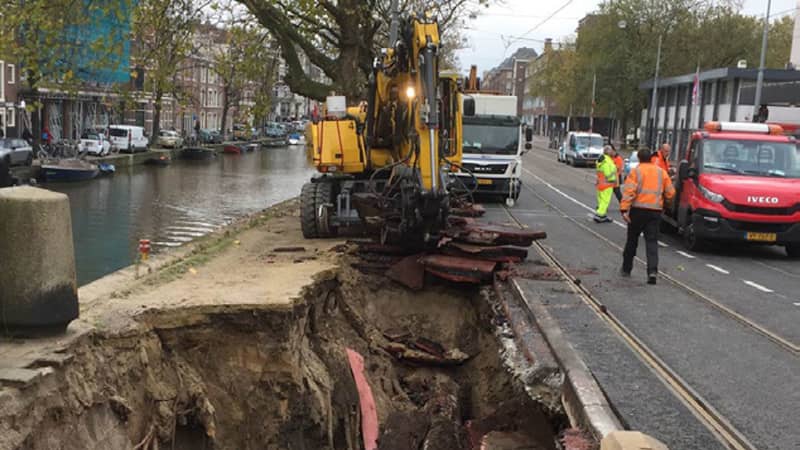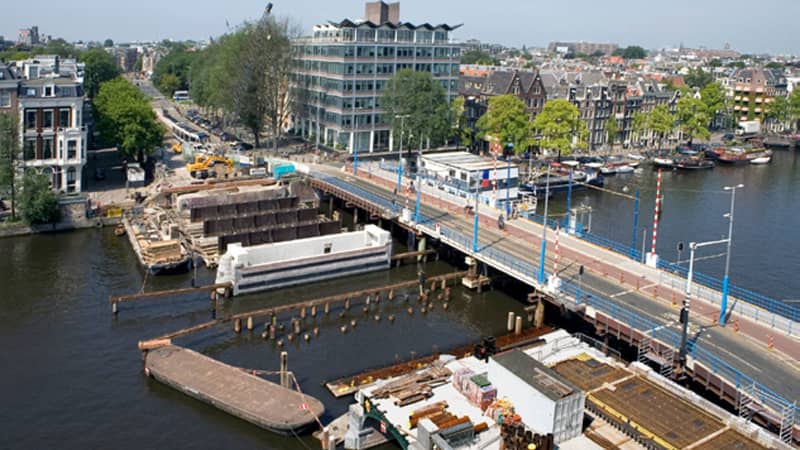(CNN) — Cracks and sinkholes are appearing alongside the waterways of Amsterdam.
Bicycles are tumbling into the swirling water as the canalsides vanish beneath their wheels.
Quay walls are collapsing against houseboats. Bridges are in trouble.
While the recent Covid-19 restrictions have relieved the Dutch capital from the more superficial blight of overtourism, it seems the city has a more pressing existential crisis.
It’s in danger of crumbling into the water it’s built upon. And only a makeover of enormous proportions can save it.
Fortunately, no one has been hurt yet, but unless it can work out how to carry out the millions of dollars’ worth of delicate repairs needed, some of the beautiful medieval infrastructure that makes Amsterdam such a popular destination could be lost.
Amsterdam’s day of reckoning shouldn’t really have come as a surprise.
The city’s children grow up with a verse: “Amsterdam, die grote stad / Die is gebouwd op palen / Als die stad eens ommeviel / Wie zou dat dan betalen?
Loosely translated: “Amsterdam, big city / It is built on piles / If the city would collapse / Who would pay for that?”
The city is now collapsing — and the Dutch are paying.
Unheeded warnings
Back between the 12th and 16th centuries, when Amsterdam began to grow, buildings were constructed on wooden piles — concrete ones came later — that provided stability in the swampy and unstable land around the Amstel river.
Canals were dug into that same soft soil and canal walls were built.
Given that many of these structures are now more than 500 years old, it’s inevitable that many of them need a check-up once in a while.
But, over the years, it seems the municipality has neglected to keep an eye on some of its most venerable constructions.
Now a significant number of its 1,600 bridges and 200 kilometers of canals need checking and, if necessary, replacing.
While dangers have frequently been highlighted in recent times, it appears that before 2020, Amsterdam’s chief recourse has been to hold its breath and hope for the best.
In January, local news channel AT5 highlighted five years of warnings from officials about the parlous state of the waterways that it said went largely unheeded by city authorities until this year.
It cited the concerns of one diver who had refused to carry out inspections under one of Amsterdam’s elderly bridges because of the fear of imminent collapse.
In response, the municipality said that repairs were being carried out when urgently needed, but although research was being carried out to assess the state of every quay wall and bridge, safety couldn’t entirely be guaranteed.
“Risks cannot be ruled out one hundred percent,” a spokesperson said.
Ancient infrastructure

The total cost of structral work taking place over the next few years is estimated at around $530 million.
Gemeente Amsterdam
Things have moved on since then, and Amsterdam is now looking down the barrel of what could be some of the biggest infrastructural challenges it’s ever faced.
At the helm is Alderman Sharon Dijksma, an elected official with oversight of traffic and transport.
After several incidents involving collapsed canal walls, she asked for an independent report which concluded that at least 5% of the city’s 200 kilometers of brick canal walls are in a poor state of repair, heightening the risk of subsidence.
The report also made some recommendations that, for the next few years at least, could fundamentally alter the way the modern city co-exists with the ancient infrastructure upon which it’s built.
Where necessary, trees may be cut down, parking spaces removed and roads closed to vehicles of over 3.5 tons. And from now on, 22.5 million euros ($26.5 million) a year will be made available for maintenance work.
Canal walls in the worst condition are at the top of the list for short-term replacement.
A close eye will be kept on the most critical spots, and if they’re no longer found to be safe, immediate measures will be taken.
Six bridges have already been partially or entirely closed and emergency measures have been taken at some vulnerable points along canals.
Among them, Rozengracht, a busy arterial road through the Jordaan neighborhood, across the Lijnbaansgracht canal, has been closed to traffic.
Unsexy topic
Another bridge at the junction of the Lauriergracht and Lijnbaansgracht canals is open only to cyclists and pedestrians. Entirely closed up until September 4, is the Entrepotdoksluis on the Hoogte Kadijk.
In the period up to and including 2023, some 27 bridges will be renovated, approximately 800 meters of quay walls will be renewed and the replacement of about 3,800 meters of quay walls prepared.
The total costs are estimated at 450 million euros, or about $530 million.
Sharon Dijksma.
“The management of the quay walls and bridges has lagged behind in recent decades because it was not given the political priority it deserves and it is not a sexy topic,” says Dijksma.
“Restoring the maintenance of the structures to a new level is a complex, large and urgent task.”
Dijksma says that while 20 locations across Amsterdam are currently closed to heavy traffic, more are likely to follow.
“Safety always comes first, but it is a huge puzzle to keep the city accessible and livable,” she adds.
To check the state of bridges and canal walls, the municipality is using traditional measuring bolts that track structural movements, but also more innovative methods such as satellite data, sonar and 3D scans.
Safeguarding the future
The process of replacing the walls and bridges is made more complex because of the limited working space on land and water congested by the presence of houseboats.
In the past, this has slowed down even small repair projects, but with time running out, officials are now expediting these processes.
“If immediate action is needed, we don’t wait for the results of extensive research,” says Albert Jongsma, project manager of quay walls and bridges for Amsterdam.
Jongsma says such assessments will be made by checking construction drawings and details from previous inspections. Following an inspection of wooden foundations or masonry, a decision is made on whether to take immediate action.
Surveys by divers and environmental scans will determine whether the structure needs closing off and shoring up by installation of steel support structures.
“The constructive condition is then determined by the available data and an additional survey with divers,” he says.
“An environmental scan is performed to determine the impact of a barrier and the impact of reinforcing with a safety construction.”
Repairs are one thing but, says Dijksma, there’s also a need to rethink how Amsterdam goes about its daily business.
“The city was once built for horse and carriage, but now huge trucks are driving over the same quays and bridges,” she says.
“We need to change this to prevent damage in the future.
“This means we have to take a look at the city logistics and improve it by, for example, creating hubs on the outskirts of the city, from where goods are brought into the city with lighter and cleaner transport.”
Even then, says Jongsma, it’s unlikely the work will ever stop as the city attempts to extend the lifespan of its elderly structures for another century.
“Based on the 100-year lifespan, about eight to nine bridges will have to be renewed every year and about two kilometers of quay wall,” he adds.
“Hopefully, this will diminish in the future if we handle the bridges and walls with care and they will last longer than 100 years.”


